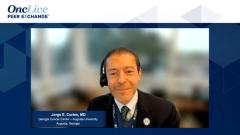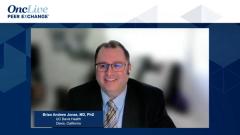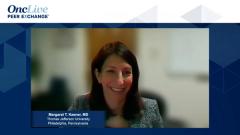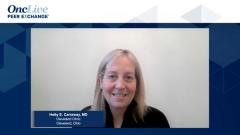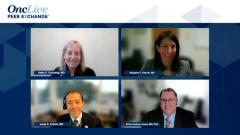
Molecular Biomarker Testing in Acute Myeloid Leukemia
In light of novel targeted agents made available to patients with AML, panelists consider the value of timely molecular testing in this setting.
Episodes in this series

Transcript:
Jorge E. Cortes, MD: That’s very important. That’s part of our understanding about the disease, and that’s what’s made all these sub-classifications. One of the challenges that we all face with this molecular characterization and with the cytogenetic characterization, because some of these are still based on the cytogenetics, is that it takes time. Dr Carraway was alluding that the problem is that these results in some academic institutions, we can get some of them a little sooner, but in general, in practice, they take a while. Dr Jonas, how do you manage that timing, from the time you get your patient and having to wait, do you start? Do you wait? How do you manage that?
Brian Andrew Jonas, MD, PhD: Thanks for that question. I agree with everything that’s been said thus far, and 2022 to me, has been a watershed year in terms of when we think about what AML [acute myeloid leukemia] is and how do we deal with it at the very beginning of a patient’s journey. This question gets to that story a little bit. There’s several lines of evidence to suggest now that you can wait to start treatment without affecting a patient’s overall prognosis. We showed that using a California discharge dataset, and it was shown in a large European study as well, but then again, the trouble with such data is these are population statistics. You’re sitting in the room with a patient who has AML, and you need to make that decision about whether they can wait. There’s several factors that go into that, and we were all raised with the idea that AML is a medical emergency, you must treat it right away or something bad will happen. There certainly are patients like that where their white count is very high, and they may have leukostasis or other complications from the high white count, and you may be forced into doing treatment quickly. There are many patients on the other hand that present with a more stable disease and more stable clinical situations, and many centers will even discharge these patients with close follow-up in the outpatient setting and allow the time that’s required for these advanced cytogenetic and molecular panels to come back so you can offer a patient optimal therapy in 2022, almost 2023 now. That’s important, but not everyone has such resources. There’s going to be situations where that’s not feasible, where patients may have come from far away and it’s not easy for them to get back to a local area. And this can put a strain on the hospital resources, to have a patient sitting in the hospital for a week waiting for things to come back. This puts the impetus on us at the field to develop better rapid readout assays and have short turnaround times that include the relevant mutations, and then you can wait for the more prognostic mutations to come back later. When you think about mutations, IDH or FLT3, and other things that might be acted upon early on having tests where those turn around rapidly and having such tests available, not just in academic centers, but to the community, I think will really help steward resources appropriately. Ultimately, there’s a lot of fear out there with the disease and the data are reassuring that we can get away with waiting in some patients. I also point out there is an increasing use of a practice of giving patients a little bit of temporizing therapy to them in these high-risk situations to wait necessarily for the start of their definitive therapy. That’s another approach that you see used more.
Transcript edited for clarity.


